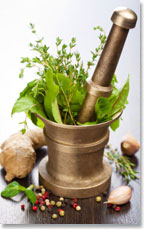 Ayurveda is a comprehensive natural health care system that originated in India more than 5,000 years ago. The earliest literature on Indian medical practice appeared during the Vedic period in India (mid-second millennium BCE).
Ayurveda is a comprehensive natural health care system that originated in India more than 5,000 years ago. The earliest literature on Indian medical practice appeared during the Vedic period in India (mid-second millennium BCE).
Over the following centuries, ayurvedic practitioners developed a number of medicinal preparations and surgical procedures for the treatment of various ailments, including emotional issues. Current practices derived (or reportedly derived) from Ayurvedic medicine are regarded as part of complementary and alternative medicine.
Ayurveda seeks to remove the root causes of mental illness in a holistic way. Its focus is on prevention through correct diet, exercise, meditation and cultivation of the right attitude. It offers a complex array of therapeutic techniques and natural medicines to restore balance and harmony.
Ayurvedic herbalism stems from Ayurveda, which originated in Greece and Rome before settling in India. Ayurvedic herbalism is considered the art of mix and formulating herbs and oils for therapeutic work. Herbs are considered nutritional supplements in Ayurvedic medicine. Their purpose is to restore balance, aid the healing process, strengthening digestion, and help the body purify itself of toxins and free radicals.
A study at the University of California at San Diego found a particular Ayurvedic herbal combination helpful for insomnia. Participants were 25 healthy volunteers aged 20 to 65 years of age suffering from insomnia. After administration of the herbs, participants fell asleep 16 minutes faster than the placebo group. The researchers concluded, “The findings suggest that traditional herbal supplements may be of significant benefit to patients suffering from sleep onset insomnia while avoiding the negative side effects of commonly prescribed hypnotics.”
Another Ayurvedic herb that has been researched in Bacopa (Bacopa monniera), shown to have anti-anxiety effects in animal research. Scientists have reported similar findings in human research, reporting that a syrup containing an extract of dried bacopa herb reduced anxiety in patients with anxiety neurosis.
A study at the School of Biophysical Science and Electrical Engineering in Australia found that bacopa extract reduced general feelings of anxiety in healthy adults as compared to placebo.60 It is believed that part of the medicinal action of bacopa lies in its ability to improve cognitive function while also soothing restlessness and nervousness.
Ashwagandha (Withania somnifera), also known as Indian ginseng or winter cherry, has been an important herb in the Ayurvedic and indigenous medical systems for over 3,000 years. Historically, the plant has been used as an aphrodisiac, liver tonic, anti-inflammatory agent, and more recently to treat asthma, ulcers, insomnia, and senile dementia. A review of studies on ashwagandha concluded that the herb possesses antistress, antioxidant, and rejuvenating properties. Ashwagandha is used therapeutically as an adaptogen for patients with nervous exhaustion, debility due to stress, and as an immune stimulant in patients with low white blood cell counts.
In the treatment of Parkinson’s, Ayurveda uses single herbs as well as herbal mixtures, and special preparations known as Rasayanas. Rasayanas are a super-concentrated mixture of vitamin-rich herbs and minerals used to treat illnesses and restore health. Purification procedures known as Panchakarma remove toxins from the physiology in preparation for taking these herbs.